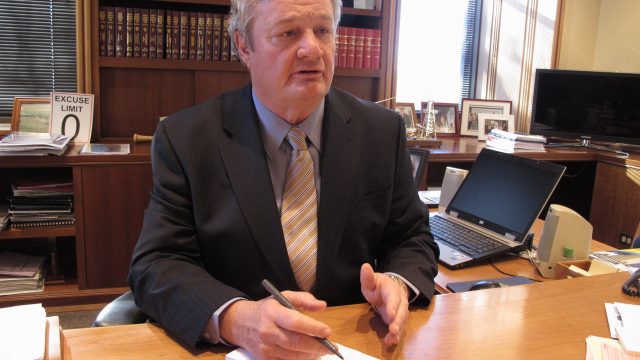Rod St. Aubyn: Will Governor Dalrymple Use Veto Power On PERS Budget Compromise?

UPDATE: Governor Jack Dalrymple did indeed sign this bill into law without using his veto power.
The NDPERS appropriation bill (SB 2022) has been a hot potato for the legislature. As you will recall this is the bill that the conference committee could not resolve which resulted in the House deciding to adjourn Sine Die without any final resolution.
The Attorney General offered an opinion that since NDPERS had a continuing appropriation authority, technically the agency could continue operating with strict limitations. However legislative leadership decided that it would be a bad precedent to leave an agency without an approved appropriation bill. As a result, the chair of the Legislative Management Committee, Sen. Ray Holmberg, appointed a special interim committee to see if some type of resolution could be found for the bill.
[mks_pullquote align=”right” width=”300″ size=”24″ bg_color=”#000000″ txt_color=”#ffffff”]Some argue that the Governor should use this veto authority in particular for the expansion of the NDPERS Board.[/mks_pullquote]
His thought was if the committee could find some solution, he would ask the Legislative Management Committee to call the legislature back into session as provided by law. The special committee did find some resolution and the Legislative Management Committee called legislators back into session about a week ago.
Members of the special interim committee were appointed as members of the conference committee for SB 2022. A couple of new amendments were offered in addition to the original compromise language, however both were rejected. Ultimately the compromised language was adopted by both houses.
Senate members originally argued that policy amendments were inappropriately added to the appropriation bill by the House. House Majority Leader Al Carlson stated that the Senate was just as guilty for adding policy amendments to appropriation bills. Doing a cursory review of the appropriation bills finds policy amendments have been added by both houses, but it does seem like the House Appropriation Committee was guiltier of doing it than the Senate Appropriation Committee. The Higher Education appropriation bill, HB 1003, was loaded with what many would consider policy issue amendments.
The Senate further argued that the policy amendments in SB 2022 never had a public hearing where public testimony could be taken. The House stated that the amendments offered were from their delayed bill, HB 1475, where there was public testimony.
However, close examination of legislative records will show that most of the amendments originally adopted for SB 2022 by the House were NOT part of HB 1475 and were NOT allowed for public comment and testimony. Among the amendments in the House version of SB 2022 included the following (only those with an asterisk were in HB 1475):
- Expansion of 4 legislators to the NDPERS Board
- Elimination of the NDPERS Board representatives from the Attorney General’s Office and the Health Department
- Pharmacy benefit manager audit requirement
- Limits NDPERS contract to 2 years for the health insurance contractor
- Limits on disclosure of health information and requirements for provider reimbursement rates
- Permission to extend current contract for 9 months if new contract had to be terminated
- Prohibition from spending funds from NDPERS reserves
In the final compromise that was adopted last week the following items were approved:
- Only 2 legislative members were added to the NDPERS Board.
- The two current board members from the Attorney General’s Office and the Health Department were NOT eliminated.
- The two year contract limit was amended to reflect current policy (2 year contract with the option of extending the contract for additional two 2-year contracts with a maximum of 6 years.)
- Language was added to specify reasons for contract extensions or contract rebid.
- The nondisclosure language and provider reimbursement rate language was further clarified.
- The exclusion of the use of NDPERS reserve funds was further clarified.
I have heard rumors that the Governor has been advised to consider a “line item veto” for provisions of the just-passed bill. The Governor is permitted to use this “line item veto” on appropriation bills. Some argue that the Governor should use this veto authority in particular for the expansion of the NDPERS Board.
They argue that this language interferes with the executive branch’s authority and is in effect “legislative micromanagement” at its worst. House Majority Leader Al Carlson points out that this contract amounts to almost $254 million dollars and the public and the legislature needs to ensure that it is handled appropriately.
It will be interesting to see how the Governor views this recently approved compromise. Will he use his line item veto authority arguing that it is a violation of the separation of powers between the legislative and the executive branch? If the Governor does veto part of the bill, what does that say about the friction that caused the premature adjournment and the special session?
If the Governor does veto part of the bill, will the legislature call itself back into session to consider overriding the veto for their final allowed day of the session? I have my doubts that the Legislative Management Committee would approve calling itself back into session for that purpose. We should know the answers to these questions shortly.




